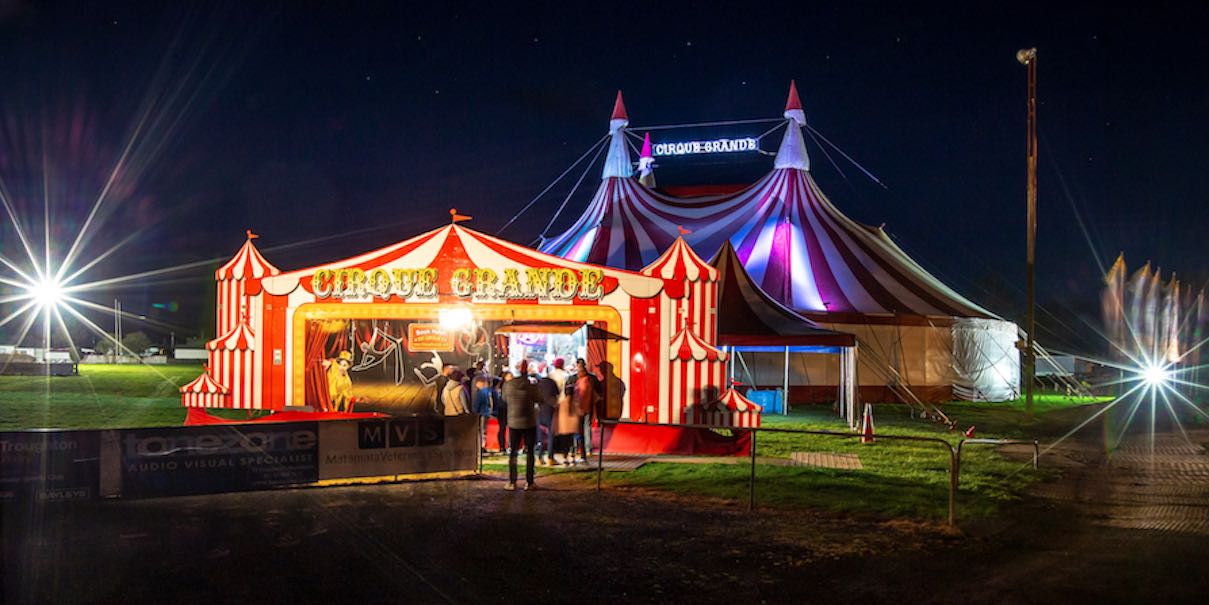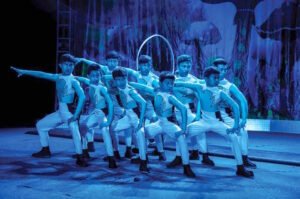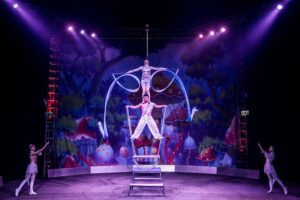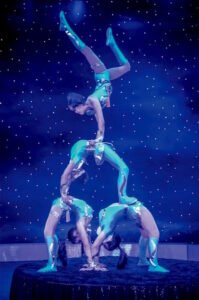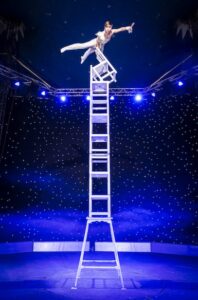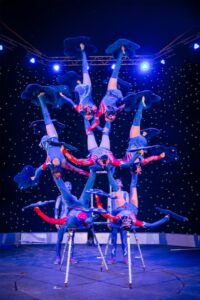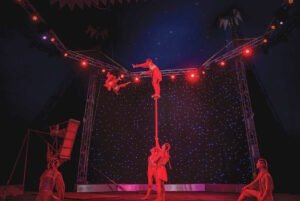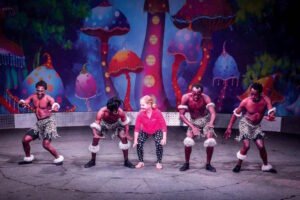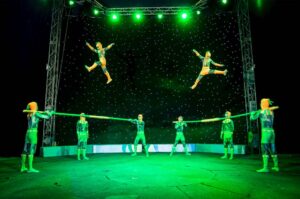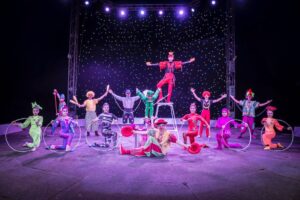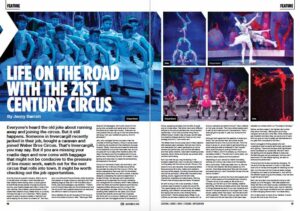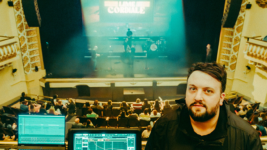News
21 Nov 2018
Life on the road with the 21st century circus
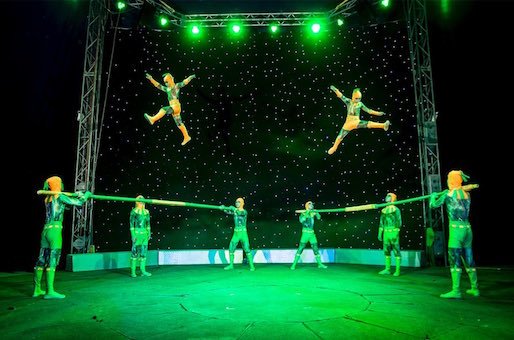
Subscribe to CX E-News
FEATURE
Life on the road with the 21st century circus
by Jenny Barrett.
Everyone’s heard the old joke about running away and joining the circus. But it still happens. Someone in Invercargill recently jacked in their job, bought a caravan and joined Weber Bros Circus. That’s Invercargill, you may say. But if you are missing your roadie days and now come with baggage that might not be conducive to the pressure of live music work, watch out for the next circus that rolls into town. It might be worth checking out the job opportunities.
And the circus is a growth industry. After a slump in the 90s when circuses in both Australia and New Zealand were closing down, a quick glance at Eventfinda shows several circuses touring the country, plus theatre-based spin-offs in most of the main centres.
Harry Weber, owner-director of the oldest New Zealand circus, Weber Bros, is currently mid-way through a run in Hamilton, “We’d usually expect to stay a couple of weeks in Hamilton but we’re staying for six which is unheard of.”
Jeni Hou, who runs Zirka and Cirque Grande, whilst lamenting that people no longer queue up overnight with their sleeping bags as they did in her Grandad’s day in China, also acknowledges a rejuvenation, “There’s a lot of choice these days but live entertainment and the circus still has a special place and not everyone can afford or travel to Cirque du Soleil.”
Harry believes the current success of the circus is due to the variety of acts on offer, “We’ve got FMX bikes for the teenagers, the human canon for the young kids, acrobatic and aerial acts to impress the adults and a laser light illusion. There are not many events that you can go to that the whole family will enjoy, from your toddlers to granny. And it’s affordable.”
- Cirque Grand
- Cirque Grand
- Cirque Grand
- Cirque Grand
Jeni, who manages the two circuses under the umbrella of Flaming Pheonix, thinks it comes down to retaining the excitement that traditional circuses invoked, “Sadly, there are some beautiful elements of the traditional circus that have been lost, but our circuses still try to keep other traditions alive. We retain the beauty and the incredible skill of circus performers, combining that with the modern music, lighting and costumes, to create the extraordinary atmosphere of the show.”
Circus is in the blood of both Jeni and Harry. Jeni descends from a famous Chinese circus family, her grandad founding the first circus in China. Her father subsequently took over with his five sisters working as performers, and Jeni’s mother, a fashion designer, overseeing the costume department.
A forward thinker, her dad saw Jeni’s aptitude for academia and supported her through marketing and management at university here in New Zealand, whilst her sister and brother became world famous magicians before taking over the running of the two Australasian circuses.
Zirka Circus has been travelling New Zealand for ten years, and Cirque Grande has recently come over from Australia. Her family still run a circus in Beijing for the tourist sector and own the biggest school of acrobatics in China, supplying acrobats into the USA, Europe, and on cruise ships.
“My father had a very different attitude to the circus business than circus owners traditionally. I think that is another thing that is different about modern day circuses, we still keep the travelling lifestyle alive but there is a lot more strategy around it,” comments Jeni.
- Zirka
- Zirka
- Zirka
The Weber Bros Circus is also back in New Zealand after several years overseas. German-born Harry, who descends from seven generations of circus owners and performers, and his Kiwi wife Marie, and their seven children, have been travelling across Australia, South Africa and Korea, as contract after contract came along.
But if you feel like you may be lacking in the ancestry department, don’t curtail your dreams of running away with the circus just yet. Circus in the blood is not a pre-requisite.
Accompanying Weber Bros alone are 30 trucks, trailers and caravans carrying 40-50 people, including the advance crew who do the promotion, office staff, the performers, lighting, sound, riggers and the tent crew, mechanics, engineers and electricians.
Flaming Phoenix also employs approximately 70 people. As with touring in the music business, it takes
a certain type of person to enjoy the circus life, “You spend eleven and a half months of the year travelling, with different venues every few weeks. But saying that we are a very friendly-family environment. There’s always about fifteen or so children so we have a teacher who travels with us. And our caravans are state of the art.”
Harry reflects on the ‘grey nomads’, “So many retired people want to sell up and travel around in campervans. That’s what we get to do year in, year out, all around the world.”
Although both agree that the weather is rarely your friend. You can almost hear Jeni shiver as she describes the wind, the mud and the rain, “And the show must go on, so we need to get everything up whilst everyone else is sheltered in their houses.” Harry pulls the plug on putting the tent up at winds of 100km, and if it is already up, the show is cancelled at 80km, “The tent won’t come down, but we worry about debris and the audience.”
Depending on your stance on health and safety, working for a circus may make up for the weather. Harry comments, “OSH stay away from us. We are in the too hard basket. We shoot people out of a cannon, have bikes doing back flips over the crowd and aerial acts but I can’t remember the last time we had an incident.”
It is also easier to control the hours that people work than in other sectors of the entertainment industry, “There’s not so much pressure. We arrive on a Monday, put the tent up on the Tuesday, weather permitting. We have complete control over that side of things because we work to our own schedule and we are in the same place for a lot longer than music shows, weeks rather than days.”
And its the same with Jeni’s operation, “We don’t push our team too hard and make sure that we have lots of laid back days between our shows which run Thursday to Sunday.” Rather, as Harry sees it, the highest risk is when they are on the road, “We’ve got a lot of long transport and we can’t drive fast. Other drivers can get impatient and take risks, so we do a lot of work with our guys on how to safely get themselves and our gear from one place to the next.”
Harry’s struggle is finding people who can understand what he wants technically, particularly with lighting.
“Gone are the days when lightshows alone impressed our audiences. We don’t want the lighting and the special effects to take over. Sometimes guys can go overboard, and you can’t see the act. It’s like theatre lighting, we want to enhance the performers.”
- Zirka
- Cirque Grand
- Zirka
- Cirque Grand
The environment is also constantly changing, “At the end of the day we work in a tent. It may have cost a lot of money and be great for blacking out the light, but the dust and the moisture levels change constantly and need to be factored in. And with all the different types of ground surfaces, it can be hard to get the sound right.”
Both Jeni and Harry are constantly trying to train people up to fill the gaps, “We need people who firstly like life on the road but also understand how to light a show but not take it over, how to maintain the gear in very tough conditions and can cope with an ever-changing environment,” surmises Harry.
All in a day’s work to many of our readers. It could be just the time to join the circus.
From the November 2018 edition of CX Magazine. CX Magazine is Australia and New Zealand’s only publication dedicated to entertainment technology news and issues – available in print and online. Read all editions for free or search our archive www.cxnetwork.com.au
© CX Media
Subscribe
Published monthly since 1991, our famous AV industry magazine is free for download or pay for print. Subscribers also receive CX News, our free weekly email with the latest industry news and jobs.

